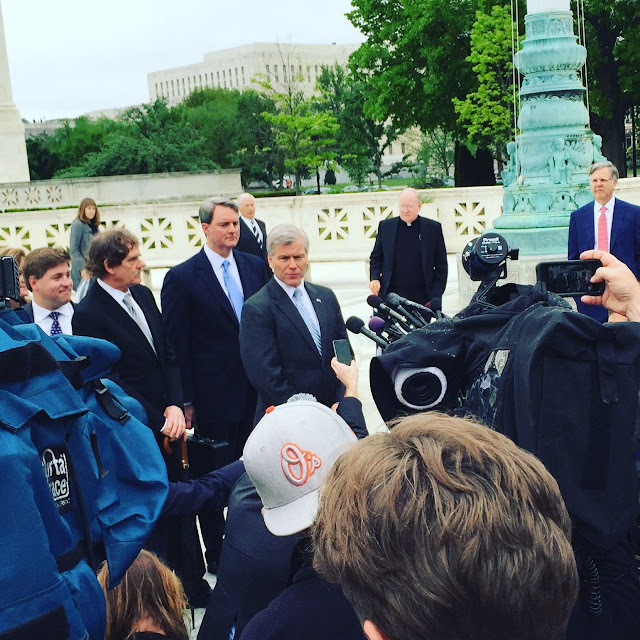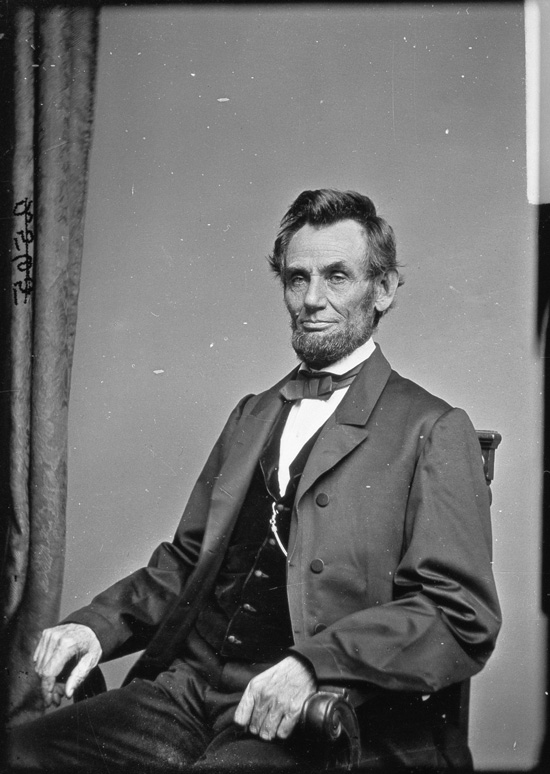Andrew Criado
McDonnell v. United States
 |
| Former Virginia Governor Bob McDonnell speaks to the media on the front plaza of the Supreme Court after oral arguments in McDonnell v. United States on April 27, 2016. |
"Must Needs Be"
In Kaley v. United States, 134 S. Ct. 1090 (2014), Justice Kagan's opinion for the Court used this interesting phraseology: "The grand jury that is good enough—reliable enough, protective enough—to inflict those other grave consequences through its probable cause findings must needs be adequate to impose this one too." (Emphasis added.)
At least that's what it said on February 25, 2014, the day it was announced. That sentence was changed soon after the opinion was released. It now says: "The grand jury that is good enough—reliable enough, protective enough—to inflict those other grave consequences through its probable cause findings must be adequate to impose this one too." (Emphasis added.)
You can see the differences below. Google Scholar's version of the opinion still says "must needs be" while the slip opinion on the Court's web site says "must be". In the altered opinion, you can tell that the spacing between letters has been increased so that the sentence still takes up the same amount of space minus the "be".
Google Scholar:
supremecourt.gov:
Lincoln at Independence Hall
On February 22, 1861, President-Elect Abraham Lincoln delivered this impromptu speech upon visiting Independence Hall in Philadelphia:
Mr. CUYLER: I am filled with deep emotion at finding myself standing here, in this place, where were collected together the wisdom, the patriotism, the devotion to principle, from which sprang the institutions under which we live. You have kindly suggested to me that in my hands is the task of restoring peace to the present distracted condition of the country. I can say in return, Sir, that all the political sentiments I entertain have been drawn, so far as I have been able to draw them, from the sentiments which originated and were given to the world from this hall. I have never had a feeling politically that did not spring from the sentiments embodied in the Declaration of Independence. I have often pondered over the dangers which were incurred by the men who assembled here, and framed and adopted that Declaration of Independence. I have pondered over the toils that were endured by the officers and soldiers of the army who achieved that Independence. I have often inquired of myself what great principle or idea it was that kept this Confederacy so long together. It was not the mere matter of the separation of the Colonies from the motherland; but that sentiment in the Declaration of Independence which gave liberty, not alone to the people of this country, but, I hope, to the world, for all future time. It was that which gave promise that in due time the weight would be lifted from the shoulders of all men. This is the sentiment embodied in that Declaration of Independence. Now, my friends, can this country be saved upon that basis? If it can, I will consider myself one of the happiest men in the world if I can help to save it. If it can't be saved upon that principle, it will be truly awful. But, if this country cannot be saved without giving up that principle---I was about to say I would rather be assassinated on this spot than to surrender it. Now, in my view of the present aspect of affairs, there is no need of bloodshed and war. There is no necessity for it. I am not in favor of such a course, and I may say in advance, there will be no blood shed unless it be forced upon the Government. The Government will not use force unless force is used against it. My friends, this is a wholly unprepared speech. I did not expect to be called upon to say a word when I came here---I supposed I was merely to do something towards raising a flag. I may, therefore, have said something indiscreet, but I have said nothing but what I am willing to live by, and, in the pleasure of Almighty God, die by.
The Union and the Constitution Forever
This image of an eagle and a banner that reads "The Union and the Constitution Forever" appears in the background of every presidential debate, but I have never seen it used anywhere else.
Lincoln and Judicial Review
During his first inaugural address, President Lincoln had this take on judicial review:
I do not forget the position, assumed by some, that constitutional questions are to be decided by the Supreme Court; nor do I deny that such decisions must be binding, in any case, upon the parties to a suit, as to the object of that suit, while they are also entitled to very high respect and consideration in all parallel cases by all other departments of the government. And while it is obviously possible that such decision may be erroneous in any given case, still the evil effect following it, being limited to that particular case, with the chance that it may be overruled and never become a precedent for other cases, can better be borne than could the evils of a different practice. At the same time, the candid citizen must confess that if the policy of the government, upon vital questions affecting the whole people, is to be irrevocably fixed by decisions of the Supreme Court, the instant they are made, in ordinary litigation between parties in personal actions, the people will have ceased to be their own rulers, having to that extent practically resigned their government into the hands of that eminent tribunal. Nor is there in this view any assault upon the court or the judges. It is a duty from which they may not shrink to decide cases properly brought before them, and it is no fault of theirs if others seek to turn their decisions to political purposes.
In Line at the Supreme Court
I took this photo in front of the Supreme Court on the morning of October 5, 2010, before I attended oral argument in Michigan v. Bryant, 562 U.S. 131 (2011).
Subscribe to:
Comments (Atom)
-
This image of an eagle and a banner that reads "The Union and the Constitution Forever" appears in the background of every pre...














.JPG)
